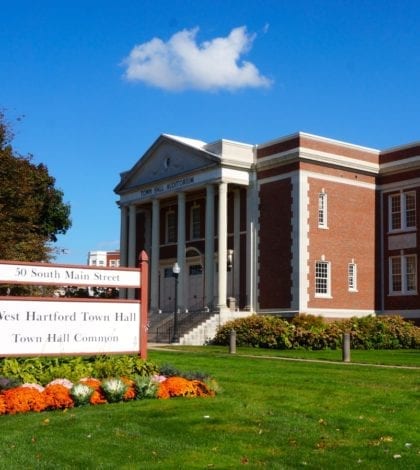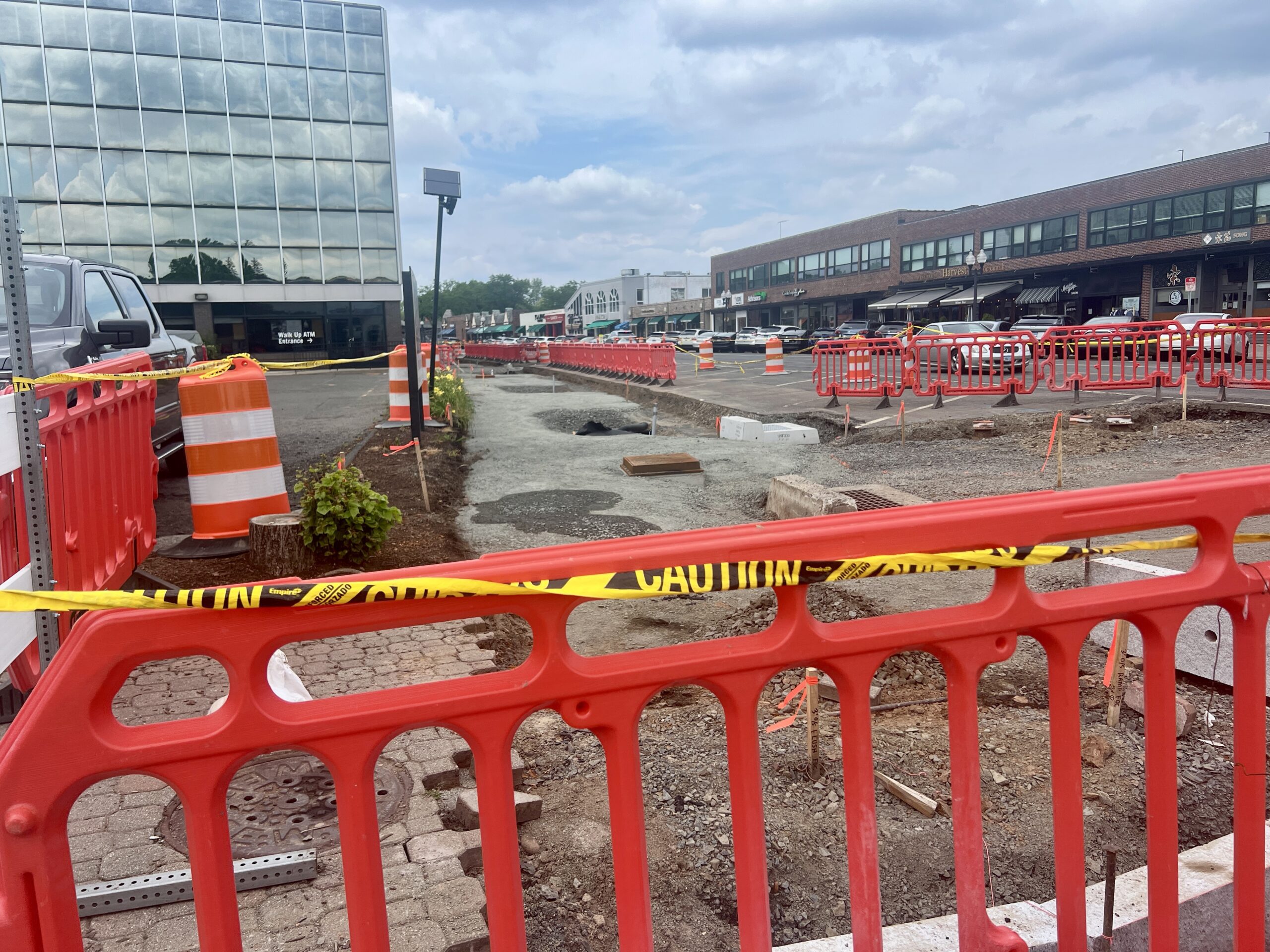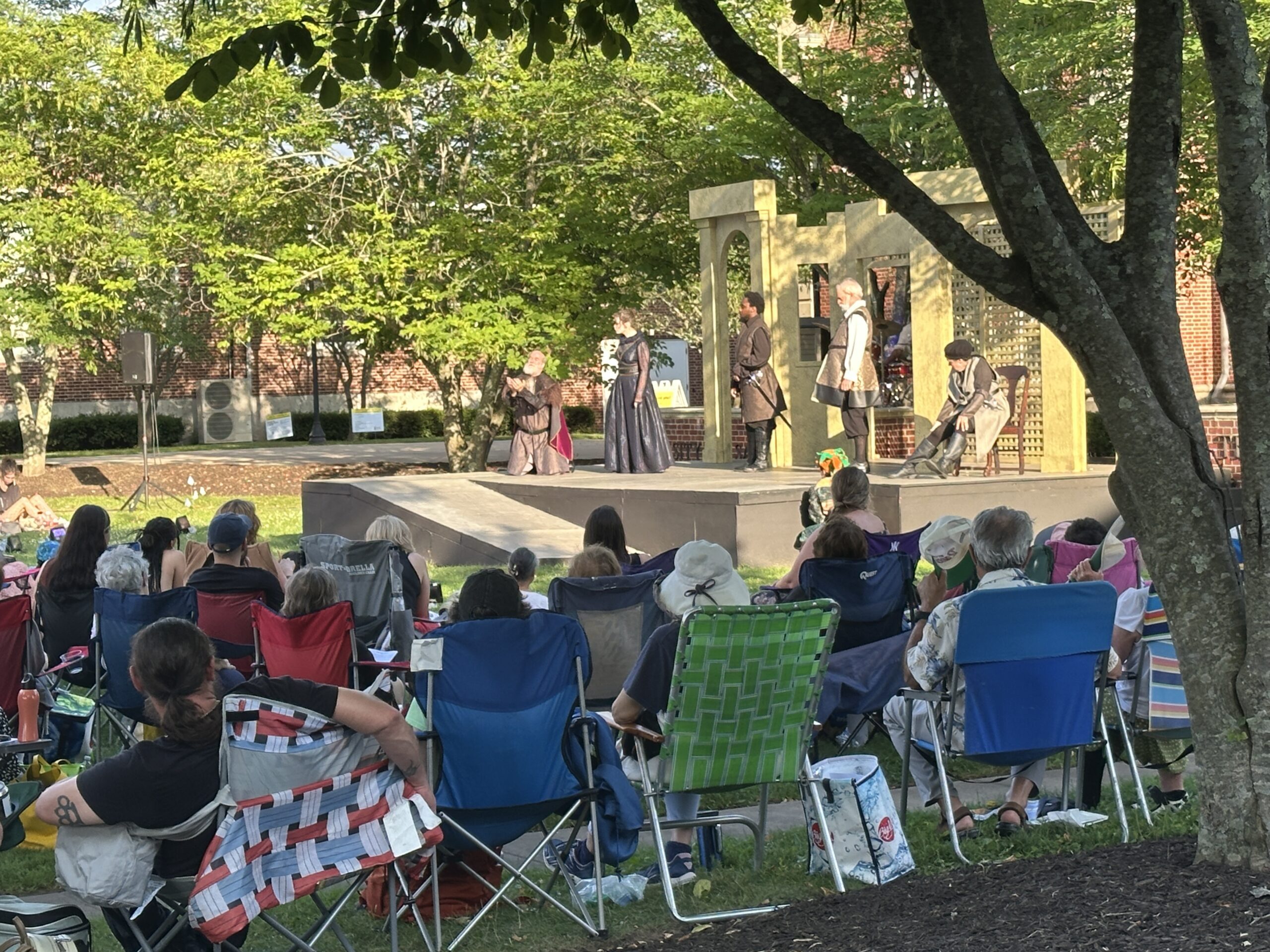Attempt to Force West Hartford Budget Referendum Unsuccessful

Audio By Carbonatix

West Hartford Town Hall. Photo credit: Ronni Newton
A petition drive did not garner enough signatures to send the West Hartford budget to referendum.
By Ronni Newton
Town Clerk Essie Labrot said Monday evening that she had received 628 signatures requesting that West Hartford’s General Fund budget be sent to voters for a referendum, far short of the approximately 2,350 signatures that were needed by 4:30 p.m. on Monday, May 21.
Labrot said that Winston Hall, a resident who had been leading a social media campaign to collect signatures on behalf of an organization he formed called “WeHa Budget Repealers,” dropped off the signed petitions at 4:25 p.m. on Monday. He had collected some of the signatures turned in, and others had been collected by Ryan Langan and other volunteers on behalf of the West Hartford Republican Town Committee, she said.
“They did not meet the threshold,” Labrot said of the number of signatures required to consider the petition valid for requiring a referendum.
The $287.8 million budget for FY2019 adopted in a 6-3 vote by the Town Council on April 24 along party lines, will remain in place, and goes into effect on July 1, 2018 with a uniform mill rate of 41.0.
The FY2018 mill rate was 41.54 mills for real and personal property, and 32.0 mills for motor vehicles. The change from a split to a uniform mill rate makes it hard to offer an apples-to-apples comparison, but documents that West Hartford CFO Peter Privitera prepared for the Town Council noted that taxes for the “average” homeowner will increase 1.6 percent.
Hall told We-Ha.com on Tuesday that he used a “flawed” approach to collecting the signatures. “I thought I could use social media and distribute templates to be returned,” he said. “I did that and it generated 300 signatures but I was expecting more.”
Hall said previously that he originally formed WeHa Budget Repealers in the spring of 2017, but not in time to attempt to force a referendum on the FY2018 budget. He moved to West Hartford in the fall of 2016, and specifically chose the town as the place he wanted to live, but was unhappy when he said his taxes increased while the appraised value of his home decreased by 10 percent.
Hall’s stated goal is “no more new taxes,” even thought it may involve “short-term pain to get long-term gain.” He did not specify any particular portions of the town’s budget that he thought could be the target of spending reductions.
Langan, who did not respond to a request for comment on the results of the petition, said previously that he was seeking a referendum because the Town Council did not see cutting taxes as a primary objective. “If there was a commitment to hold taxes steady they would find a way to get there. It’s not that hard to do it,” he said in an April 29 interview.
Even though this attempt to force a referendum failed, Hall does not plan to go away. “Next time I’ll be recruiting volunteers to staff tables, canvas West Hartford Center and neighborhoods,” Hall said Tuesday. “When we did that we generated 75 signatures a night. There are more than enough signatures to be had. I overestimated the reach of social media to collect them,” he said.
Hall said he has no plans to ever run for office, but does plan to get involved with and carefully observe the budget process.
“I do plan on getting involved with the finance committee and playing more attention all throughout the future year,” he said. “I plan on distributing information about the budget and expenditures. I think these are things the Town Council should be doing but they’re not.”
Hall, who is an actuary with MassMutual, said he has already connected with other finance professionals in town. “We plan on proposing some actions to fix the budget.”
West Hartford Mayor Shari Cantor told We-Ha.com in a recent interview that Council members have the goal of “preserving the quality of life the best we can, but balancing that with affordability is difficult” to maintain the services that residents value. “The drivers are fixed costs that take time to change. We are working on changing the trajectory of those fixed costs.” Rather than “cutting around the edges,” she said, the Town Council really needs to spend its time looking forward to issues like contracts with unions, as well as financing options for unfunded liabilities.
Cantor made the following statement on Tuesday, after hearing that the budget would not go to referendum: “We worked hard to produce a responsible, lean budget, protecting schools, public safety, and top quality services. West Hartford remains one of the most successful and well-managed towns in Connecticut and we continue to attract new families and businesses. I look forward to continuing to work with my colleagues to move the town forward.”
Had there appeared to be enough signatures on the petition, Labrot said previously that they would have had to have been certified within five days and the Town Council would have set a referendum in June. The approximate cost of holding a referendum in the town’s nine polling places would have been $27,000, according to Labrot. Fifteen percent of voters would have to vote for the election to count, she said.
West Hartford’s budget has gone to referendum in previous years, Labrot said, most recently in June 2010, when the adopted budget, which increased taxes by about 2.4 percent, passed by a vote of 4,534 voting in favor of the adopted budget t0 3,122 voting to repeal it, with 20.58 percent of voters casting a ballot in that referendum.
According to Labrot, the FY2009 budget, went to referendum twice before voters were satisfied with cuts made by the Town Council. In June 2008, 29.02 percent of voters participated in the referendum and defeated the initially-adopted budget, which in the midst of a recession and revaluation would have raised taxes by 6.9 percent, by a vote of 3,711 to 7,037. Following cut to a 5.5 percent increase, a second referendum was forced with 28.49 percent of voters participating in the election and rejecting the budget by a vote of 4,844 to 6,152. Ultimately the Town Council cut another $600,000 from the spending plan that year.
Labrot said that the FY2008 budget, which would have raised taxes 6.6 percent, was sent to referendum in June 2007, and 29.4 percent of voters voted to defeat the budget 2,939 to 7,893. The Town Council made significant cuts to schools and capital spending, Labrot said, and a second referendum was not held.
In June 2004, according to Labrot, 23 percent of voters participated in a referendum and defeated the adopted FY2005 budget by a vote of 1,508 in favor to 7,005 opposed. After Town Council reductions and a second referendum, 29 percent of voters participated in an election in September 2004 and approved the budget 6,544 to 4,267.
Like what you see here? Click here to subscribe to We-Ha’s newsletter so you’ll always be in the know about what’s happening in West Hartford!




The budget repealers were not interested in facts or analysis and offered no ideas beyond “repeal.” It’s refreshing to see that even after disseminating fake news (“28% Tax Increase – Force a Vote!”), the budget repealers couldn’t persuade a small minority of West Hartford residents to sign.
This news comes only days after front pages news stories about Connecticut’s declining home values (and West Hartford’s place as one of only 12 towns to show increased values over the last decade). Save a couple hundred dollars on property taxes and lose tens of thousands of dollars in home value? Nonsensical.
I’m glad I’m not the only one who noticed the things made in the comments above.